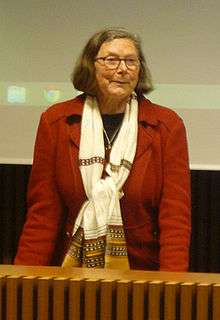Christiane Floyd
| Christiane Floyd | |
|---|---|
 Floyd speaking at a conference at the HTW Berlin on 31 March 2015 | |
| Born |
Christiane Riedl 26 April 1943 Vienna, Austria |
| Nationality | Austrian |
| Fields | Computer science |
| Institutions |
University of Hamburg Technical University of Berlin Softlab Stanford University Siemens |
| Alma mater | University of Vienna |
| Thesis | Radikale für Fastmoduln, Fastringe und Kompositionsringe (1966) |
| Doctoral advisor | Wilfried Nöbauer |
| Spouses |
Robert W. Floyd Peter Naur |
Christiane Floyd (née Riedl; born 26 April 1943) is an Austrian computer scientist. In 1978, she became the first professor of computer science in Germany, and was a pioneer of evolutionary participatory software design—a precursor to open-source software development.[1]
Born Christiane Riedl, she began her career studying mathematics at the University of Vienna, where she completed her PhD in 1966. From 1966 to 1968, she worked as a systems programmer using an ALGOL 60 compiler at Siemens in Munich, Germany. From 1968 to 1973, she worked at the computer science department of Stanford University in the United States as a research associate and part-time lecturer.[2]
In 1973, she joined the Munich software development company Softlab, where she worked as a senior consultant and was involved in the development and demonstration of Maestro I,[3] the first integrated development environment for software.[2]
In 1978, Floyd became a full professor of software engineering at the Technical University of Berlin[4]—the first professor in the field of computer science in Germany.[1] From 1991, she was head of the software engineering group at the University of Hamburg.[2] Floyd and her group produced one of the first conceptual contributions to participatory design methods with the STEPS process model (Software Technology for Evolutionary Participatory Systems development).[5] Floyd retired from academia in 2008, remaining a professor emerita at Hamburg. She has since been involved with the Vienna University of Technology WIT project (Wissenschafterinnenkolleg Internettechnologien; Women's Postgraduate College for Internet Technologies), which offers a specialised PhD program for women in the computer science field. Floyd was granted an honorary professorship at TU Wien on 26 January 2012.[6]
She was married to Robert W. Floyd and Peter Naur—both computer scientists.[4]
References
- 1 2 Thumfart, Johannes (29 March 2011). "Christiane Floyd: Emanzipation durch Computer". Die Zeit. Retrieved 4 January 2016. (German)
- 1 2 3 Prof. Dr. Christiane Floyd, University of Hamburg at the Wayback Machine (archived June 13, 2008)
- ↑ 2011 EUSSET-IISI Lifetime Achievement Award to Christiane Floyd, EUSSET (2011).
- 1 2 Von Randow, Von Gero (20 November 1992). "Frau im Widerspruch". Die Zeit. Retrieved 4 January 2016. (German)
- ↑ Simonsen, Jesper (2012). Routledge International Handbook of Participatory Design. Routledge. p. 121. ISBN 1136266259.
- ↑ "Ehre wem Ehre gebührt!". TU Wien. Retrieved 4 January 2016.
|